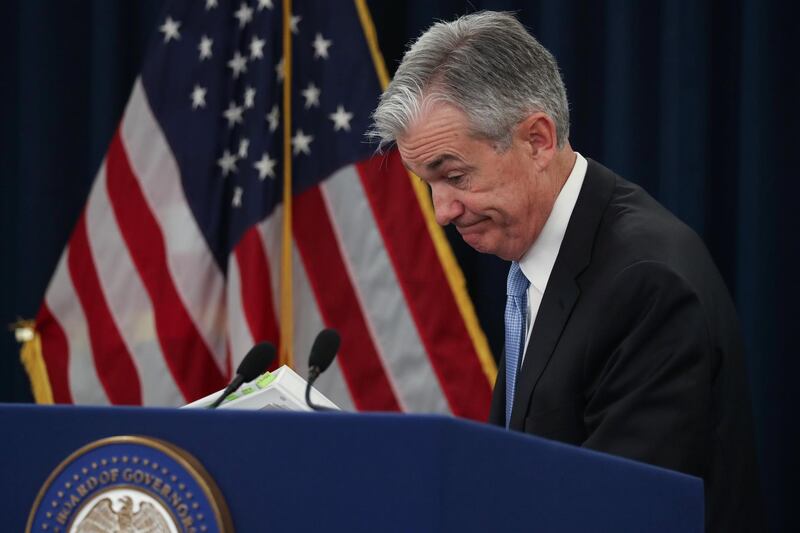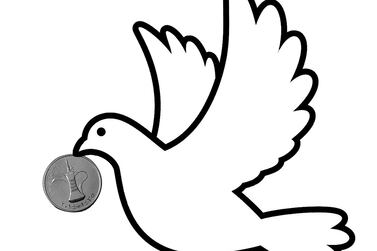The US Federal Reserve’s decision to hold interest rates steady and abandon plans to make any increases this year signalled its three-year campaign to normalise monetary policy might be at an end.
The US central bank held its benchmark rate in a range of 2.25 per cent to 2.5 per cent and revised down expectations for headline inflation and economic growth this year. As the UAE dirham is pegged to the greenback, experts said this is "good news" for UAE consumers and businesses as borrowing costs will remain unchanged.
"It may be some time before the outlook for jobs and inflation calls clearly for a change in policy," Fed chairman Jerome Powell told delegates at a two-day policy meeting.
The rate is used as a key for determining interest on most adjustable-rate consumer debt, such as credit cards and mortgages, and has a direct effect on central bank monetary policy around the world, including in the UAE and most GCC countries, where interest rate changes are dependent on the Fed as most Gulf currencies are pegged to the US dollar.
Khatija Haque, head of Mena research at Emirates NBD, said indications from the Fed mean interest rates in the US and UAE will remain on hold for the rest of the year.
"Previously they had indicated two rate increases of 25 basis points each in 2019. They are still projecting in one rate hike in 2020," she said. "The reason for the change in outlook is that recent data has indicated a slowing in US growth, particularly household spending and business fixed investment, in the first quarter of this year. If US rates remain unchanged, so will UAE rates."
The Central Bank of the UAE has not altered rates since raising its key rate by 25 bps to 2.75 per cent on December 19, following the Fed's decision to hike the funds rate by 25 bps.
On Thursday, Central Bank of Bahrain cut its one-month deposit rate to 3.1 per cent from 3.25 per cent, according to a statement on its website. However it kept its key policy interest rate on the one-week deposit facility at 2.75 per cent and also maintained both the overnight rate at 2.50 per cent and lending rate at 4.50 per cent.
Sam Instone, director of financial advisory firm AES International in Dubai, said the Fed’s latest decision was “good news for people in the UAE" particularly "anyone not saving their money or sitting on deposits in cash".
“Only three months ago, markets were in a panic over the idea that the Federal Reserve may push borrowing costs too high and trigger recessions," he said. "Now, Wall Street or at least the market for interest rate futures, is beginning to think the central bank may be cutting interest rates by the end of the year … Whatever happens, the Fed has now signalled a policy of patience.”
Ms Haque said as the cost of borrowing has not gone up, those worried about further increases in interest rates this year "should feel some relief that is now less likely to happen".
Mr Instone agreed that those in the UAE who have borrowed money for cars, property purchases or personal loans will gain the most from the Fed’s more dovish approach.
Jonathan Rawling, chief financial officer of UAE financial comparison site Yallacompare, said while borrowers might gain, savers who were hoping for greater returns "will perhaps be a little disappointed".
"Earlier this year we advised mortgage consumers to consider locking in their interest rate in view of likely rate hikes. Now that such hikes seem unlikely the perceived urgency around this has gone," he said. "Mortgage consumers are now faced with the conundrum of paying more than the variable rate to lock in an interest rate or wait and see."
Mr Rawling expects to see consumers becoming more confident about taking on variable rate loans to finance car or home purchases.
"The 2018 Yallacompare Consumer Confidence Survey for the fourth quarter of 2018 showed that 18 per cent of UAE residents claimed to have put off a large purchase in the last 12 months. This was down from 23 per cent in the first quarter of 2018 suggesting that consumer confidence was already returning," he said. "It will be interesting to see how this stat moves over the remainder of the year in view of the Fed’s announcement."
Mr Instone said investors have also gained with a US market rally "of more than 15 per cent since the fear of interest rate rises has subsided".
The Fed's swerve saw the dollar fall against a basket of currencies on Wednesday. The index that tracks the greenback versus the euro, yen, sterling and three other currencies was down 0.37 per cent at 96.028, its lowest since February 2.
"Markets were universally poised for a very benign outcome and the Fed dutifully delivered, their message overall matching the most dovish of expectations," said Richard Franulovich, head of FX strategy at Westpac.
As for businesses in the UAE, Mr Instone said sectors not sensitive to rate changes will feel the benefits, including “small companies for which borrowing costs make up a significant expense, and homebuilders and carmakers whose customers depend on financing”.
Sovereigns are likely to take advantage of the low interest environment and turn to debt capital markets to raise money and refinance maturing debt.
Thirteen Middle East and North Africa countries are forecast to ramp up their borrowing by 25 per cent to $136 billion (Dh499.5bn) in 2019 as governments continue to finance fiscal deficits and roll over debt, according to S&P Global Ratings. Saudi Arabia, the largest Arab economy, will lead the region with $29bn or 22 per cent of total commercial long-term borrowing this year, followed by Egypt with $28bn or 20 per cent of the total, and Lebanon with 14 per cent, the rating agency said.








